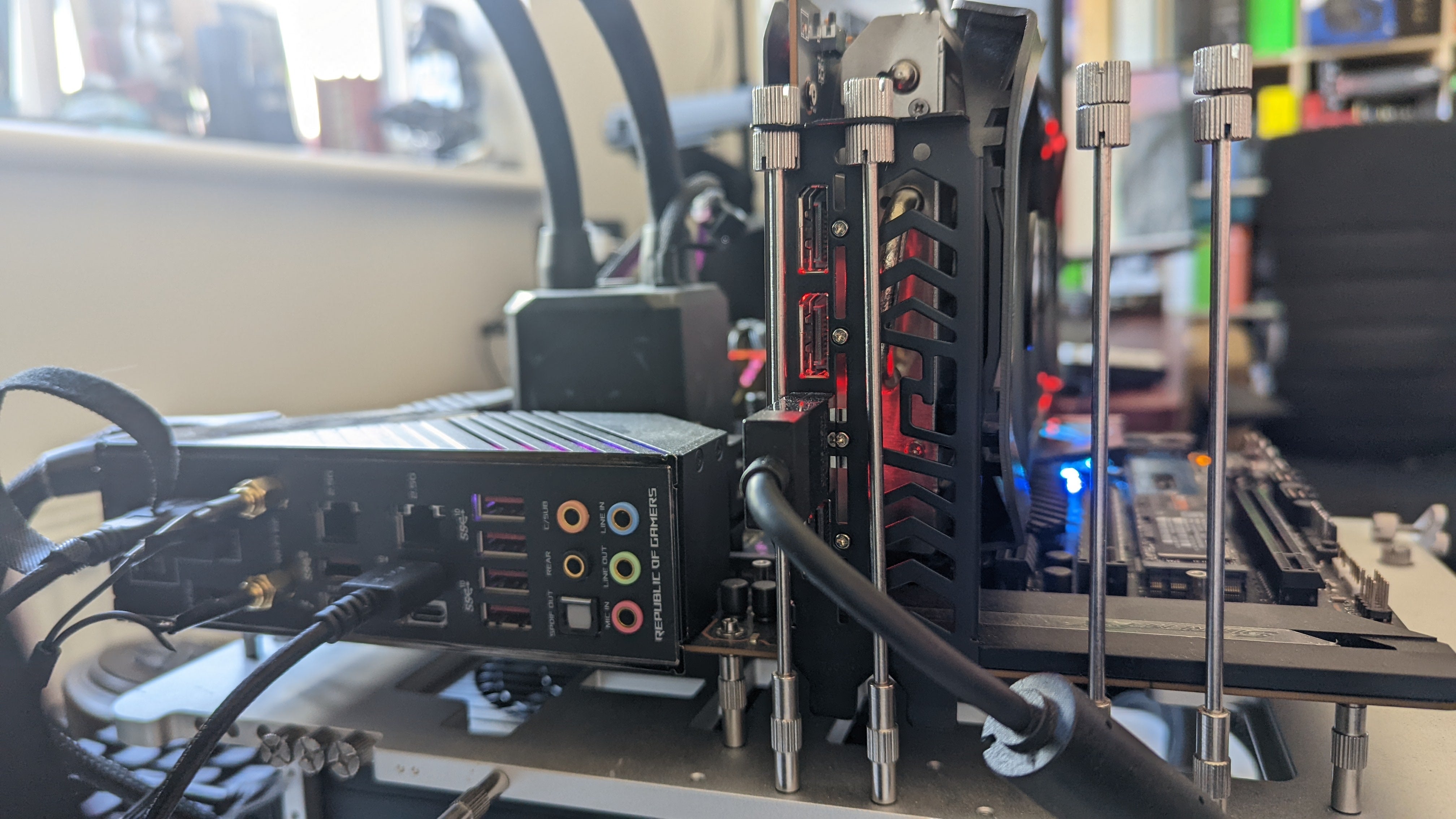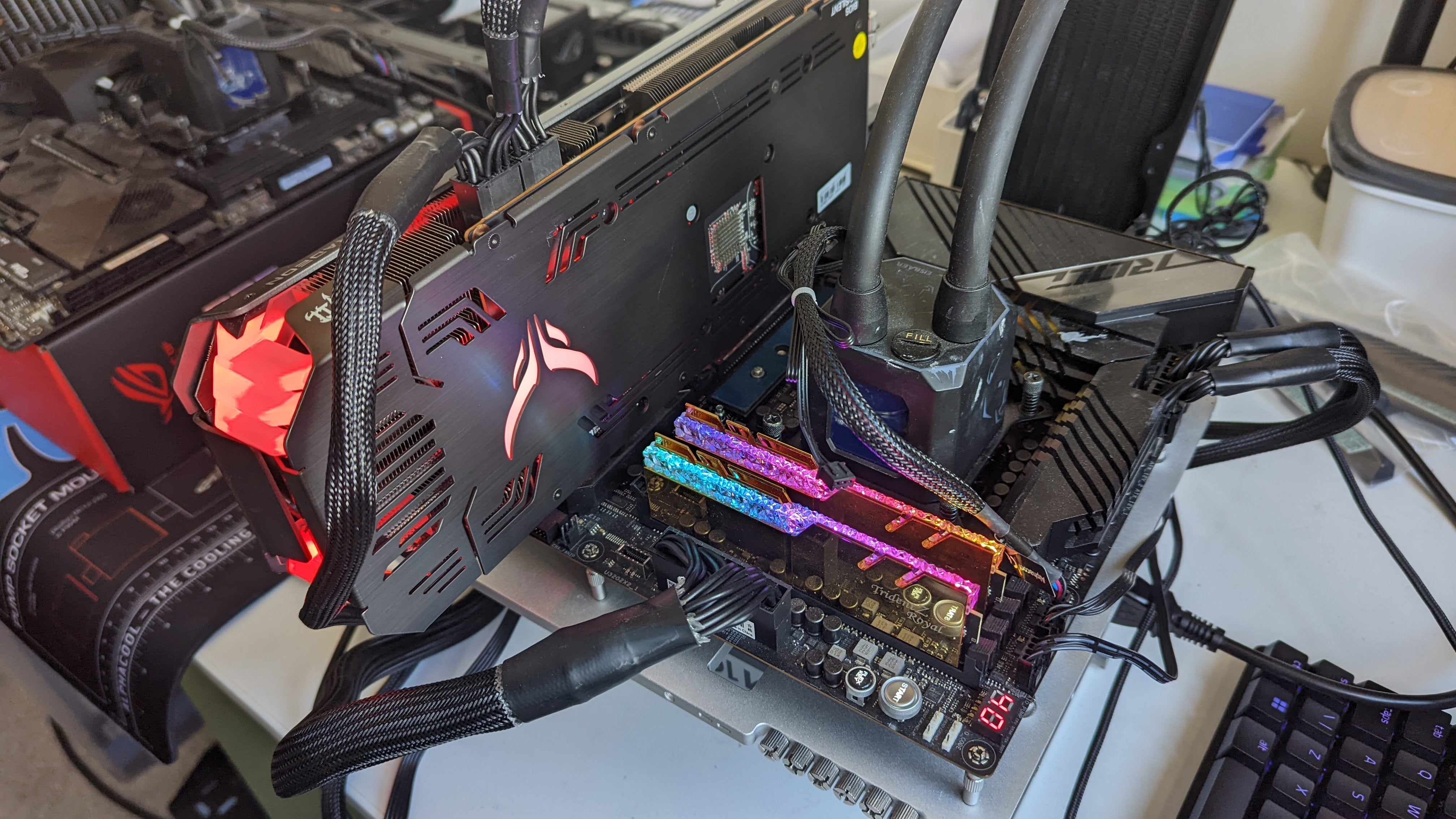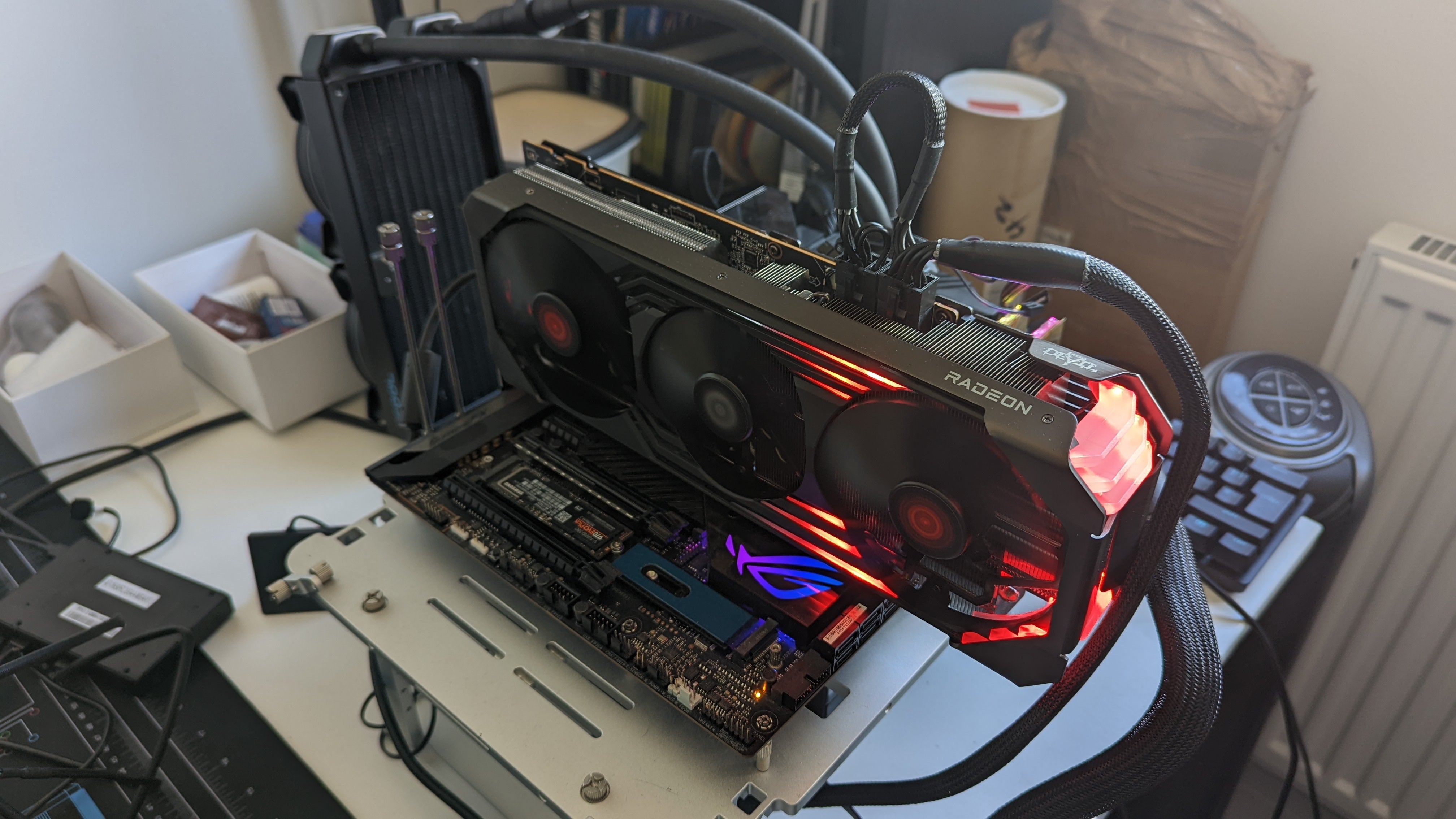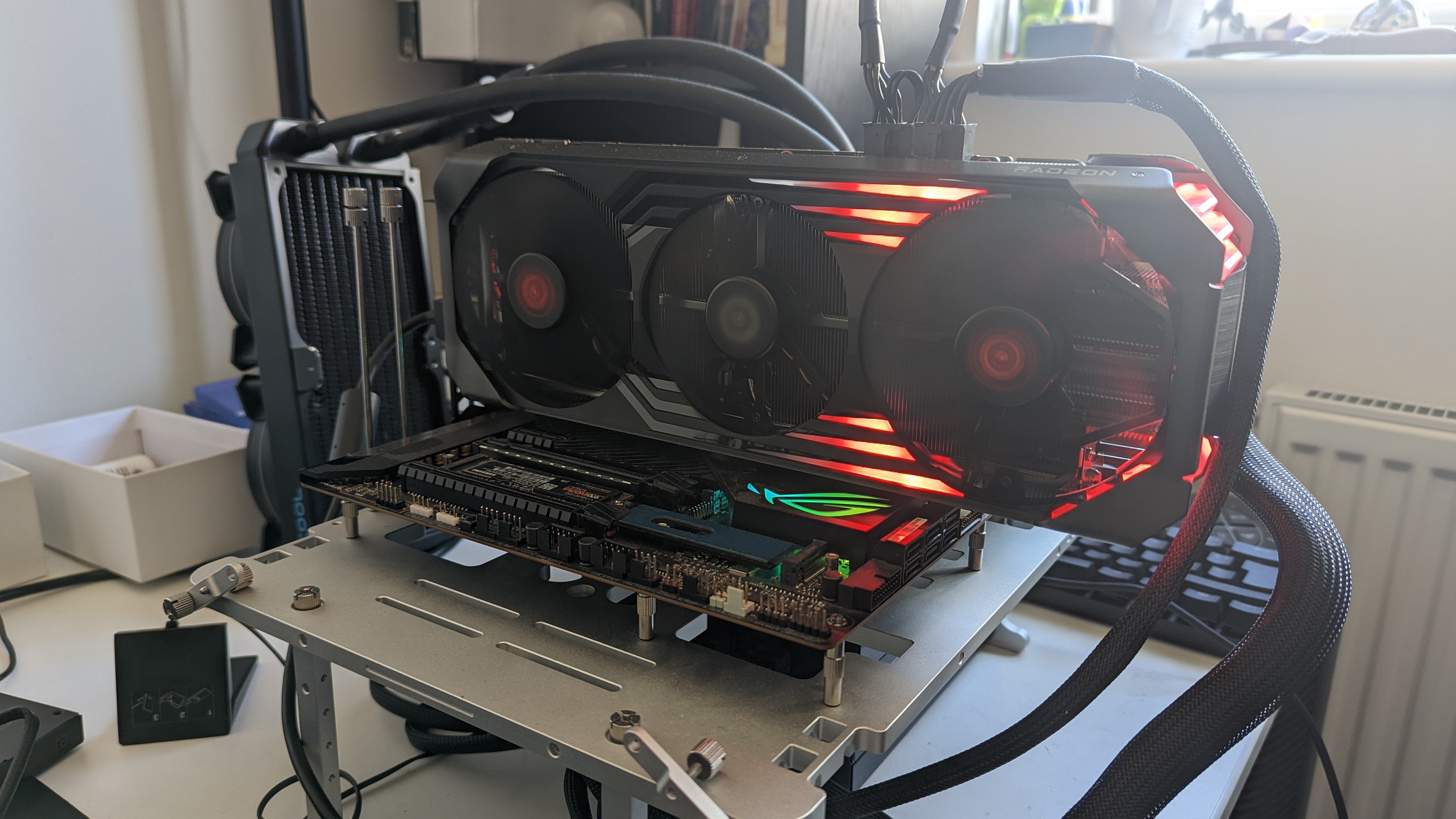AMD’s mid-gen Radeon 6000 refresh, announced today, comprises of three new graphics cards: the $399 RX 6650 XT, the $549 RX 6750 XT and the $1099 RX 6950 XT. Each offers small boosts to memory speeds (18GBps versus 16GBps for the 6750 XT against the OG 6700 XT) and slightly higher power draw (250W versus 230W). That should translate into modest frame-rate gains, but this is very much a card that slots in to replace the older RX 6700 XT rather than sitting in its own distinct power band – despite a rise in asking price. You can think of it like the Ryzen 3000 XT CPUs that debuted a few months before Ryzen 5000 – a last hurrah before the true next generation arrives.
We’re looking at the middle child today, courtesy of PowerColor who provided us with the RX 6750 XT Red Devil. It’s an attractive card with a thick thermal solution, three fans and the usual port arrangement: three DisplayPort 1.4 ports and one HDMI 2.1 port. As the name suggests, it lights up in a hellish red colour, and requires two eight-pin auxiliary power inputs.
On our unit, one of the card’s three fans seemed to have been damaged in shipping, as it knocked into the side of the shroud at low fan speeds. Thankfully, the card has a zero RPM mode at idle and doesn’t knock once it hits around 50 percent fan speed, so this didn’t affect performance and the card’s temperatures remained low (and clock speeds high) throughout.




| AMD GPU Specs | CUs | Boost Clock | VRAM | Mem Interface | TDP | Price |
|---|---|---|---|---|---|---|
| RX 6950 XT | 80 | 2250MHz | 16GB GDDR6 18Gbps | 256-bit + 128MB IC | 335W | $1099 |
| RX 6900 XT | 80 | 2250MHz | 16GB GDDR6 16Gbps | 256-bit + 128MB IC | 300W | $999 |
| RX 6800 XT | 72 | 2250MHz | 16GB GDDR6 16Gbps | 256-bit + 128MB IC | 300W | $649 |
| RX 6800 | 60 | 2105MHz | 16GB GDDR6 16Gbps | 256-bit + 128MB IC | 250W | $579 |
| RX 6750 XT | 40 | 2581MHz | 12GB GDDR6 18Gbps | 192-bit + 96MB IC | 250W | $549 |
| RX 6700 XT | 40 | 2581MHz | 12GB GDDR6 16Gbps | 192-bit + 96MB IC | 230W | $479 |
| RX 6650 XT | 32 | 2416MHz | 8GB GDDR6 17.5Gbps | 128-bit + 32MB IC | 180W | $399 |
| RX 6600 XT | 32 | 2416MHz | 8GB GDDR6 16Gbps | 128-bit + 32MB IC | 160W | $379 |
We’ve used our standard testing methodology here, which is based around a Core i9 10900K test system, locked to 5GHz on all cores and kept cool by an Eisbaer Aurora 240mm AiO. Other components include 16GB G.Skill DDR4-3600 CL16 RAM, a Samsung 970 Evo Plus 2TB SSD provided by Box, an Asus Maximus Hero 13 Z590 motherboard and a 1000W Corsair PSU.
Let’s move immediately into the gaming benchmarks. As usual, we’ll start with four games that normally are the best occasion for new GPUs to distinguish themselves against older-generation alternatives, thanks to modern game engines using DirectX 12 or Vulkan to properly make use of our 10-core 20-thread processor and push GPU utilisation to the maximum.
Then, we’ll take a look at performance in more standard games, then finish with a look at three RT-enabled titles to see if the RX 6750 XT is able to close the gap there. As usual, you can hover over the graphs to see the values, and click on them to switch between raw frame-rates and percentage differentials.
Doom Eternal
Doom Eternal: Vulkan, Ultra Nightmare, 8x TSSAA
Please enable JavaScript to use our comparison tools.
Our Doom Eternal benchmark represents a challenge for graphics cards with small VRAM allocations, thanks to our use of the Ultra Nightmare preset, but with the 12GB of GDDR6 available here the RX 6750 XT has no problems hitting a high frame-rate, even at 4K. We see a five percent performance lead at this resolution for the 6750 XT over the 6700, which would make the original card a better value if both are available at RRP.
Control
Control: High, DX12, TAA
Please enable JavaScript to use our comparison tools.
Control is a game that suits Nvidia hardware over AMD, so it’s perhaps no surprise that the RX 6750 XT also gets the short end of the stick here. At 4K, the RX 6750 XT is eight percent faster than its predecessor, but the nominally cheaper RTX 3060 Ti is even faster than that. The RTX 3070, which the 6750 XT ought to be challenging, is some 22 percent faster at this resolution. And these results are for the pure rasterised game, no RT – and as we know from previous Radeon 6000 tests, RT normally tilts the tables even further towards Team Green…
Borderlands 3
Borderlands 3: Bad Ass, DX12, TAA
Please enable JavaScript to use our comparison tools.
Borderlands 3 is another example of a game where we see relatively small performance gains for the RX 6750 XT over the RX 6700 XT, with just a three percent lead for the original card at every resolution we tested.
Death Stranding
Death Stranding: Max, DX12, TAA
Please enable JavaScript to use our comparison tools.
Death Stranding is a game that performs way better on AMD hardware, so it’s good to see that trend continue with the RX 6750 XT. It manages an effortless 74fps average at 4K, a solid eight percent lead over the 6700 XT and within a couple of percentage points of the RTX 3070.
Far Cry 5
Far Cry 5: Ultra, DX11, TAA
Please enable JavaScript to use our comparison tools.
At lower resolutions, Far Cry 5 is quite heavily CPU-bottlenecked – but as the resolution increases, differences between different cards start to become apparent. The RX 6750 XT records its best advantage here yet, with a 10 percent lead over the 6700, while again coming within three percentage points of the RTX 3070. Not bad, AMD!
Hitman 2
Hitman 2: Ultra, DX12, TAA
Please enable JavaScript to use our comparison tools.
Another benchmark that hits both CPU and GPU hard is Hitman 2. At 1080p, it’s all much of a muchness, but at 4K we can see a surprisingly high 15 percent advantage for the RX 67500 XT. The benchmark could be particularly memory-intensive, or our RX 6700 XT result might be a little low. Either way, the RX 6750 XT remains within touching distance of the RTX 3070, with our benchmarking tools recording a 3.4 percent lead for the Nvidia card.
Assassin’s Creed Odyssey
AC Odyssey: Ultra High, DX11, TAA
Please enable JavaScript to use our comparison tools.
With an anomalous result at 1080p, normalcy returns at 1440p and 4K where the RX 6750 XT is eight percent faster than the RX 6700 XT. However, the RTX 3070 does much better here, increasing its lead over the RX 6750 XT to seven percent.
Metro Exodus
Metro Exodus: Ultra, DX12, TAA
Please enable JavaScript to use our comparison tools.
It’s a nine percent lead for the RX 6750 XT over the RX 6700 XT in Metro Exodus, which please note is the fully rasterised version with RT disabled – we’ll have a look at RT performance in a little bit. Nvidia cards seem to do better here, with the RTX 3070 nearly 10 percent faster than the RX 6750 XT in this test.
Dirt Rally 2.0
Dirt Rally 2.0: DX12, Ultra, TAA+8x MSAA
Please enable JavaScript to use our comparison tools.
Dirt Rally 2.0’s built-in benchmarking functionality is brilliant – you can set up your own desired cars, stages and settings in XML – but the performance is very much what we’ve seen before, with a six percent lead for the RX 6750 XT over the 6700 XT. At 50fps, the new card delivers reasonable 4K performance, but Nvidia’s RTX 3060 Ti is able to match it at a lower price.
Assassin’s Creed Unity
AC Unity: High, DX11
Please enable JavaScript to use our comparison tools.
Good old Assassin’s Creed Unity brings another surprising result, as the RX 6750 XT manages to hold a 13 percent lead over the older card at 4K. Again, we could be looking at a scenario where the extra memory bandwidth is really coming in handy, or run-to-run variance might have pushed the goalposts slightly further apart than we expect.
Control: Ray Tracing Performance
Control: DX12, High, High RT, TAA
Please enable JavaScript to use our comparison tools.
The RX 6750 XT is significantly better than the RX 6700 XT at Control RTX, with a 20 percent lead as the average shifts from 25fps to 30fps. That’s unusual compared to our previous performance deltas, but at such low frame-rates any increase in horsepower can result in big gains so we’re not too surprised. However, AMD remains pretty woeful here, with the RX 6750 XT being closest to the RTX 3060 – rather than the RTX 3060 Ti or RTX 3070 that it’s been battling for the rasterised portion of this review.
Metro Exodus: Ray Tracing Performance
Metro Exodus: DX12, Ultra, Ultra RT, TAA
Please enable JavaScript to use our comparison tools.
It’s a similar story in Metro Exodus with RT enabled, with a decent nine percent lead for the new blood over the old, but again the RX 6750 XT isn’t able to compete against the RTX 3070 or even the RTX 3060 Ti once RT is turned on – and there’s no DLSS either to boost frame-rates, although FSR 2.0 may turn into that kind of a solution in whatever games support it.
Battlefield 5: Ray Tracing Performance
Battlefield 5: DX12, Ultra, Ultra RT, TAA
Please enable JavaScript to use our comparison tools.
Finally, we conclude with Battlefield 5 as we march unflinchingly into rocket explosions, semi-automatic rifle fire and all manner of other WW2-era weaponry. The RX 6750 XT is around eight percent faster than its predecessor, but – and stop me if you’ve heard this one before – the RX 6750 XT most closely resembles the modest RTX 3060 in terms of its RT performance. The RTX 3070 is some 40 percent faster here – and that’s with only RT reflections in use, in a level that features mud and a few shiny cars but hardly floor-to-ceiling shiny surfaces. This is AMD’s first-generation RT product, and hopefully we’ll see a big improvement in its next-gen hardware whenever that arrives.
RX 6750 XT: The Digital Foundry Verdict
So with the benchmarks in the books, the question we want to answer is this: is the RX 6750 XT worth its higher asking price over the RX 6700 XT? By the numbers, no – you’re looking at a sub 10 percent increase in performance in most games, but the card costs 15 percent more, at least in terms of the nominal US MSRP ($549 versus $479). However, as we saw with more recent graphics cards releases from both Nvidia and AMD, the higher stated prices are largely a reflection of the market – what people are actually paying for graphics cards at a certain performance level – rather than an indication of massively improved performance.
With that in mind, the RX 6750 XT is certainly not worse than the RX 6700 XT, so if it’s able to be sold in great numbers at its recommended retail price, then that’s totally fair – and we applaud AMD for taking the opportunity to bump up performance without the need to switch to an entirely new GPU die (or indeed, without the need for AIBs to architect different thermal solutions for their cards). However, if you have the option of choosing between the RX 6700 XT and the RX 6750 XT – and the latter does come with that 15 percent premium – then I’d go for the OG every time.
Be the first to comment